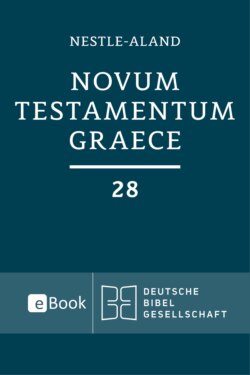Читать книгу Novum Testamentum Graece (Nestle-Aland) - Группа авторов, Nestle-Aland - Страница 51
На сайте Литреса книга снята с продажи.
Other Abbreviations in the Apparatus8
Оглавление(!)
(!) = sic! indicates an accurate transcription of an absurd reading (cf. Ac 24,5 ⸂).
add.
add. = addit/addunt, add(s)
om.
om. = omittit/omittunt, omit(s)
+ -
+ - are used in place of add. and om. where such brevity is not inconsistent with clarity (cf. Ro 16,27).
pon.
pon. = ponit/ponunt, place(s), transpose(s)
a.
a. = ante, before
p.
p. = post, after
id.
id. = idem, the same wording
ex err.
ex err. = ex errore, erroneously, by scribal error
ex itac.
ex itac. = ex itacismo, by itacism, the substitution of letters with the same phonetic value
ex lat.?
ex lat.? = ex versione latina? apparently derived from a Latin reading
bis
bis (= twice) immediately following a critical sign, refers to two equal words in the text and their variant(s) which are exceptionally identified by the same critical sign (cf. Mt 1,9 ⸀; 1,10 ⸀1).
All Latin words used in the apparatus and the appendices are translated in Appendix IV.
The following signs and notes come immediately after the critical signs with an explanation of the variant reading(s) presented:
p)
p) refers to parallel passages in the Gospels, which are listed in the margin at the beginning of the pericopes.
(L 2,7) (12)
A parenthetical reference to a passage standing before a variant reading refers to a parallel passage in another New Testament book (cf. the reference to Lk 2,7 at Mt 1,25 ⸀). If the parenthetical reference does not name a book, the parallel is found within the same book (cf. the reference to Ac 22,3 at Ac 21,39 ⸂), or the same chapter (cf. the reference to verse 12 at Mt 2,13 ⸆).
(19 v.l.)
A parenthetical reference to a verse with v.l. standing before a reading suggests that the reading derives from a variant reading in the verse indicated (cf. Mt 2,13 ⸂, which refers to the same transposition at 2,19).
(Jr 38,15 )
A reference to a passage in the Septuagint standing before a variant suggests a parallel expression in the Septuagint text (cf. the reference to Jr 38,15 at Mt 2,18 ⸆).
